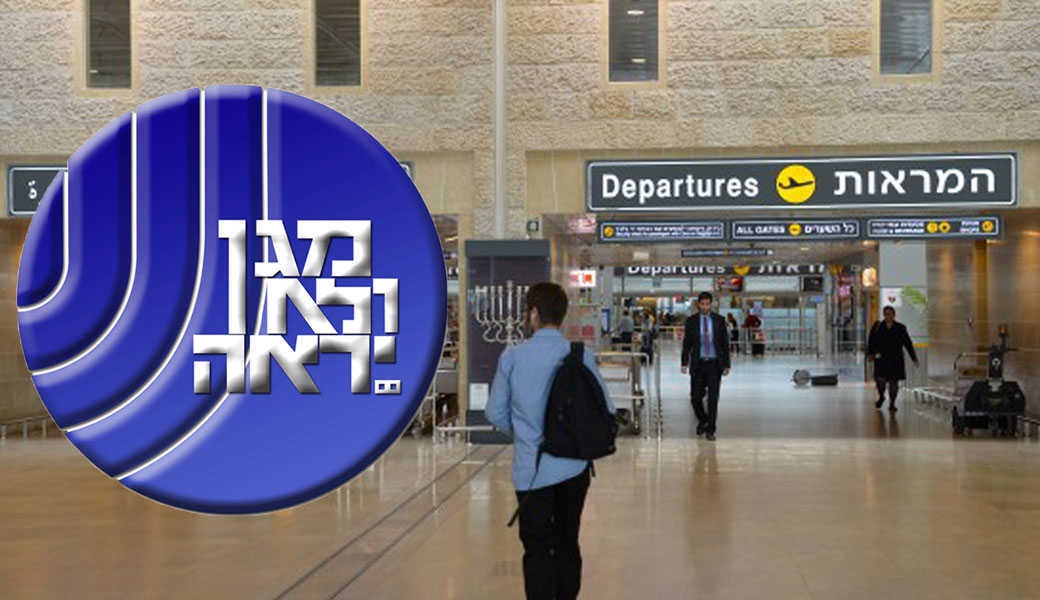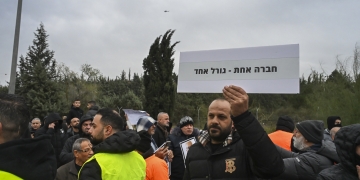July and August are the busiest months in Tel Aviv’s Ben Gurion airport. Hundreds of thousands of passengers go through the terminal each day, going to or returning from their annual vacation. For most passengers, going through passport control while entering Israel is a matter of just a few seconds, once they managed to negotiate the lines. Passengers give their passports to the Ministry of the Interior passport controllers sitting on booths, the controllers scan the passports, match the picture to the passenger standing in front of them, and in most cases return the passport after stamping it.
Most passengers going through this procedure do not notice or give it another thought, but alongside the passport comes a small piece of paper, that must be scanned in front of people standing on both sides of the only aisle that leads from passport control, to the long corridor going to baggage claim. This small note is given to indicate the passenger passed through passport control and was registered as entering Israel.

Scanning the papers after passport control | Picture by Israel Airport Authority
On some unusual cases, passengers would receive a different piece of paper, a kind that indicates the passenger did go through passport control, however the controller thought – for one of several different possible reasons – that this passenger raises security issues, in spite the fact that during the registration on his computer no indication came up.
Such passengers would be taken aside to a short questioning by Israel’s airport security. After what is usually a brief question-and-answer conversation, they would – on most cases – be sent on their way within a few minutes. From time to time, however, some of these passengers would be diverted to a thorough security check, the kind most foreign passengers have come to know flying away from Israel or flying to Israel with Israeli carriers.
There are many security “layers” and measures taken to make sure civil aviation going in and out of Israel is safe and secure, most can not be made public due to security reasons, and passport control is only one of them – a very common measure not only in Israel, but virtually in any other country in the world. Passport control computer terminals are linked to all security and enforcement branches, and once “troublesome” details appear when checking a passenger’s passports, be it a fugitive, or a person who was not allowed to leave to country due to a money debt, or a terrorist, the passport controller will immediately inform the relevant enforcement branch.
Each Israeli enforcement branches has an office on Ben Gurion airport, which is manned 24 hours a day – Police, Army, Shin Bet (Israel’s internal security service), Ministry of Interior, Ministry of Agriculture, Tax Authority and so on – so all that remains to be done by the controller is simply to dial the office at the airport, and one of those stationed at that office will immediately arrive at the controller’s booth to take the necessary actions or measures needed dealing with the passenger. It’s the part of the passenger’s journey in which he has no where to go: the passenger has already left the plane with which he came, so he can’t turn back, and he can’t skip past passport control since he doesn’t have the piece of paper (plus his passport is still being held by the controller).
“It began when we handed our passports to the official at security”, wrote journalist Peter Beinart on the Jewish-American Forward, “He breezed through the passports of my wife and two kids, then looked at mine and made a call. After hanging up, he asked me—for reasons I can’t explain—the names of my father and grandfather. Then he asked me to step aside for extra screening”.
Beinart goes on by telling on the questioning he went through, likely taking place in an area of the airport known as “mesoravim” or refused – an area designated for further questioning of passengers who were not approved entry to Israel, usually since the passport controller thought they were attempting to enter the country to work without legally issuing a work visa.
He writes he was questioned by a short haired Israeli who asked him about attending an anti-occupation rally in Hebron. He confirmed attending, and when asked on the purpose of his current visit, he said he came to his niece’s bat mitzvah. An hour later he contacted lawyer Gabi Lasky and moments later he was released.
Beinart did not understand why he was asked for the name of his father and grandfather, but any Israeli soldier that has served in the occupied territories could easily answer his question. When a name a wanted Palestinian is being passed between army checkpoints, the name will always be very long: first, the name of the wanted man, then name of his father, the name of his grandfather and only then comes the surname (my name, for example, would be Haim-Pinchas-Jacob Har-Zahav).

Quesioned for an hour. Peter Beinart | Photo: Wikimedia Commons
This is the common writing of Palestinian names on the Palestinian population registry, and this is also how they appear on Shin Bet records. The reason is quite simple: The odds of finding two persons with the same first and last names are not small. You can even find three different Haim Har-Zahav, not the most common name on this planet. The odds of finding two persons with the same first name and same father’s name are smaller, and the odds of finding two with the same grandfather’s name are slim. The conclusion, then, is that checking all three names would always yield the right person needed for questioning.
The article Beinart published struck waves in Israel and America. His questioning at the airport joins at least five other passengers going in and out of Israel who were delayed for questioning. Most stories were published on Haaretz newspaper, but Shin Bet was reluctant to answer Haaretz’s question on whether it was now following left activists.
Due to Beinart high media profile, Shin Bet published a rare public statement saying: “Shin Bet is operating only according to its destination and for the country’s security. The delaying of Mr. Beinart was done due to a mistake in judgement by the professional element on the field”. Prime Minister Netanyahu also issued a statement saying Beinart’s questioning was “an administrative error”.
Both statements were made to create the impression that someone – not to high up the ladder, apparently – decided to act and delay a person for no apparent reason. However, these statements do not sit well with entry protocols to the state of Israel as known to passport controllers and airport security employees in the past and present.
In general, and countless Arab-Israelis would testify about it, Jewish-Israelis and Jews who are not Israeli are treated far better than any other group of passengers in Israeli airports. The Jewish passenger’s belongings would go through the x-ray machine just like everyone else, but the suspicion towards Jews is the lowest – probably a result of an understanding this is the most unlikely group to endanger civil aviation going in or out of Israel.
This indicates that Beinart – a Jew coming to Israel to attend a Jewish ceremony – should not have been asked any questions at all except those encountered by anyone ever flying out of Israel (from where did you come to the airport; do you have a weapon; were you given anything to be delivered to another person). On no circumstances was he supposed to be asked any other questions, let alone be taken to questioning on a side room.
[mailmunch-form id="672118"]
The controller has seen a message on his computer terminal saying the man he just punched his details in, is under surveillance by Shin Bet, the same sort of message he would see if a known member of Hamas was to suddenly appear on Ben Gurion airport. Beinart became a “wanted” name, just like those passed between soldiers at army checkpoints on the west bank.
This was no standard security check in which the security worker has raised suspicion, as there are no such security checks while entering Israel; This was no Shin Bet employee acting on his own with ill judgment, and deciding to “pull” Beinart out of the line, as no one except the passport controller holding the passport has any means to know who is going through passport control at that exact moment; This was no “administrative error” as described by Prime Minister Netanyahu:
This was a computer alert received by the passport controller, about a would-be-terrorist or at the very least terrorist-connected person standing two feet from him. The alarm came directly from the security branch whose job is to track terrorists – Shin Bet – and it identified Beinart as a threat since he participated in a rally in Hebron.
If there was any doubt in the past, if one could wave off suspicions on security branches marking people participating on leftist events, the analysis of the Beinart incidents – and mainly Shin Bet’s attempts on denial – indicate those doubts should be removed.
[mailmunch-form id="672118"]














